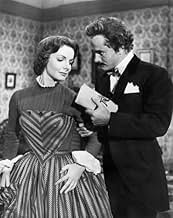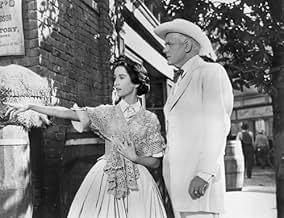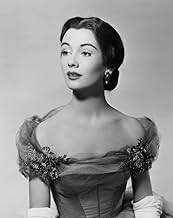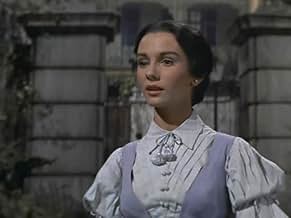Füge eine Handlung in deiner Sprache hinzuA tragic and sentimental story that depicts the early career of the 19th century American actor, Edwin Booth with some mention of the events leading to the assassination of President Lincoln... Alles lesenA tragic and sentimental story that depicts the early career of the 19th century American actor, Edwin Booth with some mention of the events leading to the assassination of President Lincoln by Edwin's brother, John Wilkes Booth. In the film, Edwin's days in the spotlight dwindle... Alles lesenA tragic and sentimental story that depicts the early career of the 19th century American actor, Edwin Booth with some mention of the events leading to the assassination of President Lincoln by Edwin's brother, John Wilkes Booth. In the film, Edwin's days in the spotlight dwindle shortly after his brother is caught and killed for assassinating Lincoln.
- Regie
- Drehbuch
- Hauptbesetzung
- Old Ben
- (as William Walker)
- Stagehand
- (Nicht genannt)
- John Booth at 12
- (Nicht genannt)
- Edwina Booth
- (Nicht genannt)
- Actress as Mrs. Montchesington
- (Nicht genannt)
- Protester at Theatre
- (Nicht genannt)
- Farmer's Wife
- (Nicht genannt)
- Protester at Theatre
- (Nicht genannt)
Empfohlene Bewertungen
The story of the brother of a high profile figure who shot President Lincoln was also compelling. Edwin Booth's great career on stage was overshadowed by his brother's political actions.
This was also a great performance by Raymond Massey as the Father of both John and Edwin. These were great stage actors giving great performances.
The movie gave me an appreciation of a performers life back in the days when actors where not making the big money and performed because they loved the art. I recommend it!!
The movie only goes from 1852 (when Junius Booth died) through 1866, when the American public showed Edwin Booth that it did not hold him or his family guilty for the stupid, vicious act of his brother. It does not carry the story down to Booth's death in 1893, with his success as the definitive Hamlet of his age, and his failure as a theatrical producer. Edwin Booth worked until about 1891, due to the debts he accumulated. But his last years were stable, with his second wife. He also found time to create the Player's Club (still located in his Gramercy Park brownstone). Only the tragedy of the President's death at his brother's hands left a really brutal mark on him.
Derek does the most with his role - showing the strong desire for "real fame" that took control over John Wilkes. As his character kills the character played by Massey in one film, he ironically also attends the hanging of John Brown - historically correct. But his intricate plot to first kidnap Lincoln and then kill him, and his relations with other conspirators is not really gone into. Still, the assassination, chase, capture, and death of the assassin are done fairly correctly. But to get the tone of the government's prosecution of the conspirators, see John Ford's film.
Asia Booth (sister of Edwin and John) was a character in this movie. In real life, she wrote a biography of her brother John. It is interesting to read. She does not condone John's infamous bad deed, but she explains John's history from childhood.
There was at least one more sibling in this family: Junius Booth, Jr.
John Wilkes Booth had previously been employed by Laura Keene in her acting company, she who had produced the play "Our American Cousin" the night Lincoln was shot. One year before, John Wilkes lost his job with her. He was a very handsome man, and fancied himself somewhat of a matinée idol.
Laura Keene was America's first female theatrical producer and director, and I feel that she fired John Wilkes due to his self-centered and egotistical demands. Perhaps he was no team player, and was miffed for being fired by a woman.
He had a year to hatch his conspiracy for the demise of Lincoln and other cabinet members, including time to gather his co-conspirators. Thankfully, part of the plan was botched. The other cabinet members escaped being killed. Lincoln had several tickets, including a pair for General and Mrs. U.S. Grant. The Grants declined, as did several other invitees. This is why the Lincolns were the only couple in their box.
Lincoln had just been re-elected. The war was over. The South had lost. John Wilkes Booth had a twisted idea that he must make amends for the 'bad' state of things. The rest is history.
Too bad this helped put Edwin Booth's career into eclipse for awhile. Edwin was so talented, though, that he actually managed to salvage what was left of his career and put it back on track.
The story takes us through the young Edwin growing up, traveling with his famous actor father, and at times standing in for him. Eventually he himself becomes a great actor, and in fact, was known as the greatest Hamlet of his day. But personal tragedy strikes in his marriage and in his brother John's assassination of President Lincoln.
John Derek makes a dashing John Wilkes Booth, handsome and charismatic. Massey, a man who played Lincoln on film and recording as well, is the elder Booth and is excellent as the flamboyant drunkard. And it's wonderful to hear him recite Shakespeare.
"Prince of Players" was a showcase for Richard Burton. In 1955, when this film was released, he was young, handsome, and extremely romantic looking. Classically trained, he possessed, as he always did, a magnificent voice and a great talent. To hear his Shakespearean recitation in this film is a real treat, and there is a lot of it, including Hamlet, Richard III, and Romeo & Juliet. Sadly, Burton came from a poor Welsh family and never got over it. In pursuing movie money, he took roles in mediocre films and did very little stage work, though he shined in "Camelot" and "Equus." His last Broadway appearance, shortly before his death, was a disastrous "Private Lives" with his ex-wife Elizabeth Taylor. His fans, however, choose to remember this sweet and charming person as a glorious Prince Hal in Henry IV and as Hamlet. How wonderful that film audiences can hear his gifts forever in "Prince of Players."
Wusstest du schon
- WissenswertesAnti-slavery activist John Brown figures in this film and is seen in silhouette in a jail cell in one scene. Raymond Massey, who plays Junius Brutus Booth, played Brown in Land der Gottlosen (1940), the same year he played Abraham Lincoln in Abe Lincoln in Illinois (1940). He also played Brown in Sieben Reiter der Rache (1955), which was made the same year as this film. In real life, John Wilkes Booth was a witness at the 1859 hanging of John Brown.
- PatzerWhen Edwin goes to meet John at their sister's request, the soldiers in the saloon and guarding John Brown's cell are wearing gray uniforms with blue trim. This is Hollywood's version of Confederate Infantry uniforms. However, Brown was executed on December 2, 1859, a full year before South Carolina seceded from the Union. The uniforms should have been Federal regular Army dark blue.
- VerbindungenFeatured in Great Performances: Richard Burton: In from the Cold (1988)
Top-Auswahl
Details
Box Office
- Budget
- 1.570.000 $ (geschätzt)
- Laufzeit
- 1 Std. 42 Min.(102 min)
- Seitenverhältnis
- 2.55 : 1
































